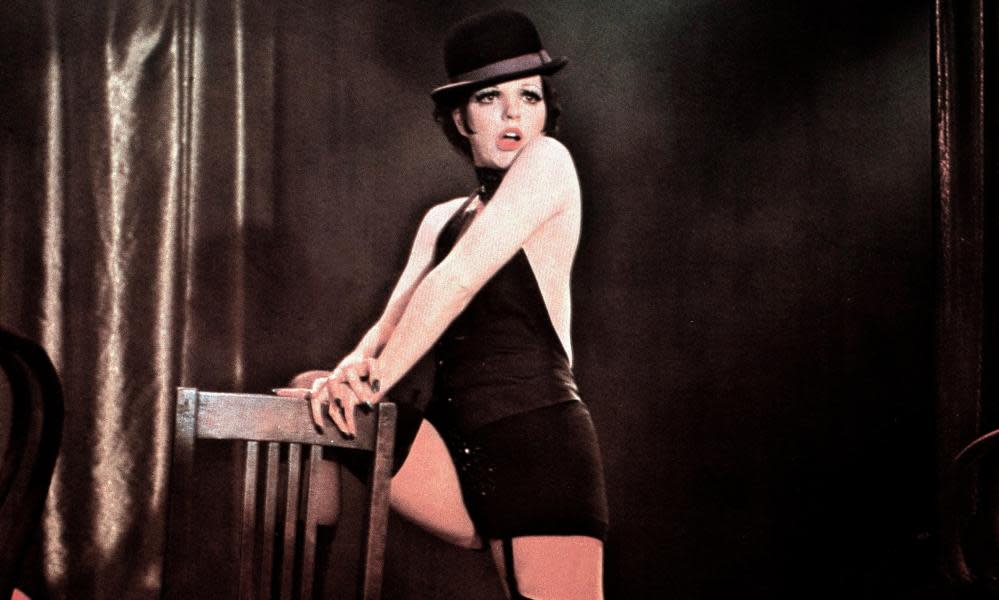Cabaret review – Liza Minnelli musical still divinely decadent and chillingly relevant

‘Still think you can control them?” Dizzied by their divinely decadent menage à trois in Weimar Berlin, cabaret singer Sally Bowles (Liza Minnelli), shy scholar Brian Roberts (Michael York) and suave aristocrat Baron von Heune (Helmut Griem) linger in a beer garden to watch a creepy blond boy singing Tomorrow Belongs to Me with the entire crowd ecstatically joining in – a satanically catchy and authentic-sounding Nazi marching song, brilliantly pastiched by Cabaret’s writer and composer, John Kander and Fred Ebb. (Brian’s question is famously addressed to the Baron, who had airily claimed the Nazis could be controlled after they had done the dirty work of crushing the communists.) It is a sensational moment in this addictive movie, based on the stage show Cabaret and Christopher Isherwood’s original stories about prewar Berlin, uniquely choreographed and directed by Bob Fosse and rereleased now for its 50th anniversary.
Maybe its views on gender fluidity and consent are confrontationally tactless in 2022 compared with 1972 or 1931. But its view of fascism is still very relevant: extremism and racism are enabled by cynicism, irony and exhaustion. This time around, I couldn’t watch Joel Grey’s death’s-head grin as the MC presiding over the raucous Kit Kat Club without thinking of smirking Elon Musk in charge of the unending Twitter quarrelfest.
Bowles is the star turn of the Kit Kat, a gadabout American who lives in a rackety Berlin boarding house where she meets sweetly unworldly Brian, a research student at King’s College, Cambridge, who has come to teach during the long vacation. Brian is to fall in love with Sally, but also to see her enamoured of the coolly predatory and wealthy baron who is to sweep them both up in his own whirl of jaded sensual diversion. And all the time, the Nazi presence spreads across the city like a rash, while the sinister MC – whose own private life is a mystery – seems to intuit or satirise it, or, ambiguously, welcome it, as something that can’t be helped. While he’s doing his bizarre hands-knees-and-boomps-a-daisy routine in Lederhosen with the chorus girls, the manager is being brutally beaten up outside the club by Nazis furious that they have not been allowed in.
Related: Liza Minnelli’s 20 best films – ranked!
Minnelli is glorious, perhaps especially in the classic opener Mein Herr – even better here, I think, than Marlene Dietrich singing Falling in Love Again in The Blue Angel. With magnificent hauteur she tells an infatuated lover to get lost. In the past, I have always imagined that she is addressing some middle-aged married man, a pathetic guy who has spent all his money on her while his wife and kids go hungry. But watching the movie again I can see it’s actually addressed to poor future-Brian (the song comes immediately after meeting him) and it prophesies the terrible end to their relationship. In fact, all of Minnelli’s songs are wonderful; it’s interesting to watch her final number, the hymn to the cabaret itself, in which the cramped stage seems suddenly to quadruple in size and looks more like Vegas or London’s Talk of the Town: it’s a very Judy Garland moment.
Cabaret is still an amazing experience, a world fiddling while Rome prepares to burn: gloomily sexy, elegant, with an overwhelming sense of evil.
• Cabaret is released on 6 May in cinemas.

 Yahoo Movies
Yahoo Movies 
